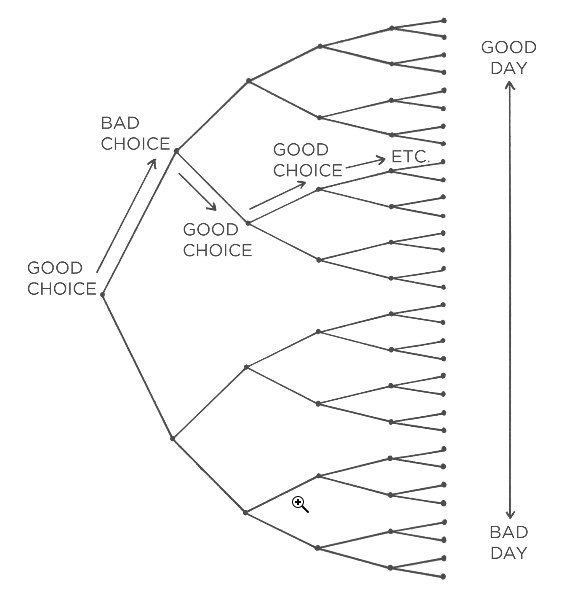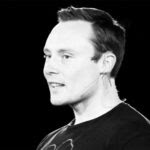By Benjamin Hardy
There are some important truths to remember while creating a life you want. Here is a list of important things to remember and apply as you go through the ups and downs of creating a bigger, better future.
- “Measure the gain, not the gap.” Dan Sullivan, the founder of Strategic Coach, created the idea of “measuring the gain.” It’s simple: instead of constantly measuring yourself against your future ideal, measure yourself against where you were previously. By seeing progress, your confidence and sense of momentum will increase. Your gratitude will increase. Your appreciation of where you are now will increase.
- Measure progress every day, week, month, quarter, year. At the end of each day, take the time to review and report any forms of progress. A few small wins every single day is all you need. Albert Einstein said, “Compound interest is the eighth wonder of the world. He who understands it, earns it; he who doesn’t, pays it.” The way to create a “compound effect” in your life is through consistent, small actions every single day. Invest a little bit of money — even a few dollars — every day and over a decade, you’ll be rich. Read a little bit — even a few pages — every day and over a lifetime, you’ll be wise. Look back every day and measure your progress. Look back every week and measure your progress. Every month, every 90 days, every year. These short 10–30 minute “review” sessions will boost your energy and confidence more than you think. They help you realize just how far you’ve come. This is crucial because during the challenges of day-to-day living, it can be easy to focus on the difficulty, which can burn you out. Regularly reviewing growth and progress is the needed shot of energy.
- Measure and report progress to someone else, daily. Pearson’s Law states that, “When performance is measured, performance improves. When performance is measured and reported back, the rate of improvement accelerates.”
Simply tracking what you’re doing creates awareness. This awareness empowers you to make the changes you want. For example, in The 4-Hour Chef, Tim Ferriss recommends taking a picture of everything you eat, before you eat it.
This form of tracking allows you to be aware and thus, to make a conscious decision, before you do it. But he goes one step further, in addition to taking a picture of everything you eat before eating it, you need to send that picture to an accountability partner.
This principle isn’t just about eating, though — it’s really about anything you want to improve. You must track every aspect of what you want to improve and you need to report your progress to important people. Without measuring and accountability, you’re not committed.
- Celebrate even the smallest victories, all the time. Dr. BJ Fogg has spent the past two decades studying behavior design and habit formation. The creators of the social media platform, Instagram, were students of BJ’s at Stanford and used his research to make Instagram sticky, addictive, and successful.
What BJ has found is that habits are not actually formed through repetition. Instead, they are formed through deep emotion, which is why some habits or addictions can start after just one event.
To build habits quickly, BJ recommends actively celebrating even the smallest wins. And he doesn’t mean a small celebration. He wants you to have a full-out, “YEAHHHH!” moment where you fist-pump in the air (or do any form of celebration that feels natural to you).
This creates a positive association with your desired behavior, which impacts your subconscious. As he stated, “To create a habit fast, cheer for yourself while you’re doing the new habit you want, or cheer just after completing it.”
- Reset every day, week, month, quarter, year. Mahatma Gandhi said, “Each night, when I go to sleep, I die. And the next morning, when I wake up, I am reborn.” Measure your progress at the end of the day. But whatever happened, let it go. Every day is a fresh start. Every week is a fresh start.
Every month is a fresh start. Every quarter is a fresh start. Every year is a fresh start. Take advantage of as many “fresh starts” as you can. But also, get better and better at finishing. Finish the day strong.
Finish the week strong. Most people can start well, which is why fresh starts are so powerful to engineer into your life. But finishing well is not so easy. The better you get at finishing, the more confident and successful you’ll be.
There is a powerful productivity technique called the Pomodoro Technique — where you have a timer and give yourself 25-minute “focus sessions,” followed by a short mental break. The goal is to get as many successful Pomodoro’s as you can in a single day or work session. Whether you use this exact method or not, the principle is on-point. Get better at focusing and finishing. Focus, recover, focus, recover. Get in flow and stay in flow.
- Take 5-minute mental breaks regularly (but not to distract yourself on the internet!). Whether you use the Pomodoro Technique or something else, take breaks. The exact amount of time between intervals is less important than the fact that you’re doing it. Whenever I’m reading or writing, I naturally take a mental break every 30–60 minutes to get up, grab water, and walk around. I’m always blown away how much insight and clarity I get during these short breaks, even just going to the bathroom. When you walk away from a problem for a few seconds or minutes, usually the insight or connection you need flows naturally to you. But if you immediately distract yourself for your break, you probably won’t get that insight.
- Don’t disrupt ‘flow’ while you have it. Flow is the mental state when you’re totally absorbed in what you’re doing. It’s ultimate focus, and where your best creative breakthroughs are. If you’re someone who wants to be successful in any way, you need to design your life to be in a flow state for several hours each day. You can be in flow while working, but also while doing anything — playing a game, watching a movie, relaxing. It’s about being fully present. The worst thing you can do is constantly interrupt your flow, especially while you’ve got it. If you’re having a great moment with your loved ones, don’t kill it by pulling out your phone. That one decision takes you down the wrong path of the decision tree (see image below)— creating negative momentum and a loss of flow. The same is true of work. If you’re in flow and focused, take your short mental breaks. But stay in flow by going for a walk or something, not by grabbing your phone and mindlessly scrolling social media or the internet. That will make it very hard to get right back into flow.
- 3 hours of creative ‘flow’ every day is all you need to change your life. We live in the “hustle” culture where we’re led to believe we need to work 20 hours per day to be successful.
The most productive countries in the world work way less than an 8-hour workday. It’s not about how many hours you work, but the quality of those hours.
If you’re in flow — and if you’re well-prepared for those hours through quality sleep, recovery, and mindset — then you can knock-out in a few hours what otherwise would have taken 10X as long.
Most people’s “working time” is not done at peak performance levels. When most people are working, they do so in a relaxed or distracted fashion.
Makes sense, they have plenty of time to get it done. When you are results-oriented, rather than “being busy,” you’re 100 percent on when you’re working and 100 percent off when you’re not.
- The first 3 hours of your day will make or break you. Richard Whately said, “Lose an hour in the morning, and you will spend all day looking for it.”
If you utilize the first 3 hours of your day, and if you’re in a flow state during that time moving powerfully toward your biggest goals, you’re going to be constantly moving forward in your life.
If you’re not utilizing your first 3 hours, then you’re probably not moving forward powerfully in your life.
According to psychologist Ron Friedman, the first three hours of your day are your most precious for maximized productivity. “Typically, we have a window of about three hours where we’re really, really focused. We’re able to have some strong contributions in terms of planning, in terms of thinking, in terms of speaking well,” Friedman told Harvard Business Review.
- If you win in the morning, you’ll win at life. The opposite is also true, if you fail in the morning, everything else will fall apart. Each choice you make ripples into the next choice.
In the brilliant book, Atomic Habits, James Clear shows how choices create momentum (see image just below). One bad decision usually leads to other bad decisions, whereas one good decision allows for more good decisions.
One of Stephen Covey’s 7 Habits of Highly Effective People is “putting first things first.” When you put first things first, and live effectively in the morning, you’ll be a better person.
You’ll feel better about yourself, which will enable you to have hope and happiness toward life in general. You’ll notice the good more and stop obsessing about the bad. This will improve your relationships.
People will want to be around you because you’ll make them better. But if you’re not “putting first things first,” and if you’re not using your mornings well, you’ll slowly become bitter and pessimistic. Your relationships won’t be as beautiful. You’ll pull others down.

- It’s easier to ‘approach’ a desired future than ‘avoid’ an undesired present. Psychologists have found that our behavior is generally motivated in one of two ways — either we are trying to “approach” something we want or “avoid” something we don’t.
Although both are powerful, it’s far more sustainable long-term to be focus on what you want, rather than what you don’t want. What you focus on, expands. This is also true of improving your habits.
Rather than spending all of your energy focusing on what you’re trying to fix, just focus on what you want to improve. As you make small positive changes, overtime, your desire will go away for the behavior you don’t want.
Fill your life more and more with what you want, and the things you don’t want will naturally fade-out. This will take time, so be patient with yourself. Measure the gains and realize how far you’ve come. You’re doing great! Keep going!
- Your future is as bright as your faith, and to this fire you must constantly add fuel. Florence Shinn said, “Faith knows it has already received and acts accordingly.” Psychologists are finding that hope (similar to faith) is incredibly important. Do you want to know how important hope is? Try looking at your life without it. When hope is lost, everything is lost. Without hope, you can’t have agency or the ability to make choices. As Dr. Smadar Cohen-Chen and Dr. Martijn Van Zomeren said, “Without hope, there can be no basis for agency, which informs goal-directed action.” You need faith and hope in your future. The more hope you have, the more you’ll believe you can actually create that future through your own actions. But also, there’s one other part of having hope that is crucial — you need to have a pathway to getting from where you are to where you want to be.
- ‘Learning’ is about getting results, which means un-learning old ways. Joe Polish has said, “Winners find ways.” In a research article looking at hope in students, the researchers came to the following conclusion: “High-hope students also find multiple pathways to reach their goals and willingly try new approaches. Low-hope students, on the other hand, stick with one approach and do not try other avenues when stymied. Instead of using problem-focused thought, the low-hope students often use counterproductive avoidance and disengagement thinking.
Reinforced in the short term by their avoidance thoughts, low-hope students continue their passivity. Unfortunately, they do not learn from past experiences.
High-hope students, however, use information about not reaching their goals as diagnostic feedback to search for other feasible approaches.” What got you here won’t get you there. If you want new and better results, then you must find “better ways” to getting what you want. Finding or creating better ways is called learning.
If you are committed to a bigger future, you’ve got to unlearn what is keeping you where you’re at. Just because something worked in the past doesn’t mean it will work at higher levels. You need to continually adjust your process as your goals evolve — otherwise, you’ll plateau and stop progressing.
- Your goal shapes your process. In philosophy, there is a concept called teleology, which says that all behavior is outcome or goal-driven. When you go to the bathroom, you’re being driven by an outcome. When you unconsciously reach for your cellphone, you’re being driven by an outcome.
All behavior is outcome-driven. Even if those outcomes are emotional or unconscious. The core point here is this: Your “process” or “path” must be based on the outcome or result you want.
As Stephen Covey put it: “Begin with the end in mind.” You must first start with the result you want, and then “reverse-engineer” the process. You do this through research — reading, asking experts, getting mentoring from people who have done it. You can only create a successful process or path if you know exactly where you want to be. Also, as stated earlier — an effective “process” always involves measuring and reporting progress along the way.
As you measure and report your progress, you’ll be able to refine your process to ensure that process is producing your desired result.
- Your “process” or “path” is based on your current level of knowledge and commitment. Your current process or “path” is based on your current level of knowledge and commitment. The truth is, there are many better ways to getting what you want than how you’re currently going about it. But in order to find or create a better path, you need more knowledge and more commitment. The more committed you get to the result you want, the more willing you’ll be able to do whatever it takes. As Michael Jordan’s performance coach, Tim Grover said, “Crave the result so intensely that the work is irrelevant.”
- Commit to specific results. In the book, The 15 Commitments of Conscious Leadership, the authors state, “Commitment is a statement of what ‘is’. You can know what you’re committed to by your results, not by what you say your commitments are. We are all committed. We are all producing results. The result is proof of a commitment.” This is a very humbling statement. Whatever results you’re currently getting is what you’re committed to. Commitment is reflected in results. If you want different results, you need to commit to different results. What results do you really want? When are you going to fully commit? When are you going to burn the bridges? When are you going to let go of “old ways”? When are you going to continue being content with where you’re at?
- Desires must be turned into tangible, measurable results (i.e., “goals”) in order to be powerful. Your brain needs tangible and measurable — not broad and undefined. As Dan Sullivan has said, “Our eyes only see and our ears only hear what our brain is looking for.” In psychology, we call this selective attention. Your brain needs something specific so it can help you find the pathways to getting what you want. If your desires are broad, then your brain won’t have the focus or attention to get it. For example, “wanting to be healthy,” is very different from, “I want to weight 165 pounds, be able to run 10 miles, and have less than 13% body fat.” The more specific you are in the outcomes you want, the more your brain can effectively find paths to getting what you want. You need specific outcomes to have hope and motivation. Think about everything you currently want — now turn it into specific and measurable outcomes. Once you have specific and measurable outcomes, you can develop effective paths or processes to getting what you want. This will increase your hope and motivation — as we as your goal-directed action!
- The most fundamental aspect of being ‘human’ is our ability to imagine futures. According to Dr. Roy Baumeister, consciousness is really about imagining different “futures.” Human beings are different from other species in that we can consciously imagine different future possibilities and scenarios.
Sadly, research from Harvard shows that people spend very little time imagining their future self. Imagination is a skill, and something most adults don’t master. As a conscious human being, your job is to imagine desired futures and then to organize your life to create those futures.
This is how you progress and find joy in life. Your current attitude and behavior is directly based on your view of your own future. This is why we are seeing skyrocketing numbers of distraction, depression, addiction, suicide, etc.
Many people’s view of the future is increasingly pessimistic and negative. When your view of the future is negative, your experience and behavior in the present is negative.
Hence, it is your responsibility to not only imagine a better future, but you must fuel your faith and hope in that future so that you can remain motivated and striving toward that future.
This is how you maintain and increase your agency as a person, even while much of the world is forfeiting their agency. This is why you must be intense about avoiding media and behaviors that kill your hope.
- Your identity is based on your goals. Your identity is very important: it’s how you see and define yourself. Your identity determines your behavior and outcomes. But here’s what’s crazy — your identity actually comes from your view of the future. More specifically, your identity comes from your goals.
For example, if you’re trying to get a college degree, then your identity is that of a college student. If your goal is run a marathon, then you’ll identify with that goal. Whatever it is you’re actively pursuing, that’s where your identity and behavior will be.
Hence, it is incredibly important to choose the right goals. If your goal is simply to “make rent,” then that will shape a very limited identity and behavior.
You can raise your vision for yourself. As Paul Arden has said, “You need to aim beyond what you are capable of.
You must develop a complete disregard for where your abilities end. Try to do things that you’re incapable of… If you think you’re incapable of running a company, make that your aim… Make your vision of where you want to be a reality. Nothing is impossible.”
As a human being, you have the innate gift of consciousness…which is imagining futures! The more conscious you become, the more creative you’ll be about your own future.
You’ll also be more powerful at creating that future. Your identity is based on your goals — choose wisely.
- “If you have more than 3 priorities you have none.” Jim Collins, the author of the famed business book, Good to Great, said that. If you have more than 3 priorities, you have none. What are you really focused on? What are you really trying to accomplish and become? You’ve got to make some decisions — which means you’ve got to remove alternative options.
What are you going to go big on? Who is your desired future self? What are the priorities and values that really matter to you? Where are you distracted on and investing in lesser matters? Jim Rohn said, “Learn how to separate the majors and the minors. A lot of people don’t do well simply because they major in minor things.”
What are the minor things you’ve prioritized in your time and life? What are the “goals” you have that are a waste of time. What can you remove from your future, your identity, your selective attention, and your behavior?
- Focus creates motivation and momentum. As you zone-in on what really matters, you’ll start to get clear on your chosen future. Clarity creates motivation, because clarity allows for an effective path. If you’re pursuing too many things, then you won’t be effective.
This will kill your motivation and in turn, your momentum. But as you weed-out the noise and focus on just a few key priorities that matter to you, your path and process will improve.
You’ll begin creating amazing momentum toward the life you really want. You’ll stop worrying about what everyone else is doing. You’ll stop being caught-up in all the noise.
- Small wins create confidence and momentum. Research shows that confidence is the byproduct of recent performance. This is why getting small and consistent wins is crucial. Every small win builds your confidence, which expands your view of your future.
This is why mornings are so important. If you get some solid wins in the morning, you’ll have more confidence throughout your day. You’ll be on the right side of the decision-tree, where good decisions lead to more good decisions. This is also why measuring the “gains” or progress is so powerful By measuring progress every day, week, month, quarter, and year — you’ll see recent progress. This will boost your confidence, which will help you commit to an even bigger future.
- If your priorities haven’t evolved, then you haven’t evolved. “Measuring the gain” also involves measuring how your views and priorities have changed overtime. The truth is, you’re not the same person you were 1, 3, or 5 years ago. You wanted stuff in the past that you no longer want.
Your future self will not want things that you currently want. How have your priorities evolved overtime? When I first became a foster parent of 3 kids, they weren’t my biggest priority. I gave them some of my time and attention, but I didn’t give them my heart. I was focused on other things. But over the past 5 years, they’ve become my biggest priority and focus.
- You’re not the same person you were 12 months ago. You’re not the same person you used to be. You’ve learned and experienced things. You wouldn’t do things the same way your former self did them.
Consequently, you can celebrate the progress you’ve made. You can also give your former self huge kudos for their efforts in getting you where you are now. Yes, your former self made some mistakes. But they deserve empathy and compassion above all else.
- You won’t be the same person in 12 months from now. Dr. Daniel Gilbert, the Harvard Psychologist said, “Human beings are works in progress that mistakenly think they are finished.” In his research, Gilbert found people can easily see changes in their current self and their former self.
Even still, people consistently under-predict how much they believe they will change in the future. Most people assume that who they are right now is, for the most part, who they’ll always be. This is what Dr. Carol Dweck calls a “fixed mindset.” The truth is: Your future self will be VERY different from who you are today. Your future self will be more different from who you are today than you can presently imagine.
But you won’t evolve and develop as much as you could if you don’t take the time to imagine your future self. Who do you want to be in 12 months from now? What would happen if you fully committed? How specific and measurable can you make your future self? How big can you make this vision? How bold are you willing to make your path and process? How much are you willing to learn, and unlearn?
- Work on yourself, not your job. Jim Rohn said, “Work hard at your job and you can make a living. Work hard on yourself and you can make a fortune.” You need to constantly be learning. You will never arrive. Even when you think you’ve got it figured out, you don’t. In the future, you’ll see things differently. You’ll have to re-learn old lessons. But if you’re constantly learning and “working on yourself,” then you’ll always be growing and evolving. Your vision and ambition will continue to grow, which will push you to bigger opportunities.
- 80% of energy should be dedicated to learning. For best results: Spend 20% of your energy on your “work” and 80% of your energy on recovery and self-improvement. When you’re getting high quality recovery, you’re growing. When you’re continually honing your mental model, the quality and impact of your work continually increases.
This is what psychologists call, “Deliberate Practice.” It’s not about doing more, but better training. It’s about being strategic and results-focused, not busyness-focused. In order to engage in true and deep deliberate practice, you must have a clear FUTURE SELF that you are striving to become. If you’re spending 80% of your time improving and progressing as a person, then your vision will grow. Your confidence and capability will grow.
Your ability to produce results will grow. Thus, you won’t just be “improving how you do a job.” You’ll constantly be outgrowing your “job” and doing bigger, more important, and more challenging projects. You’ll be making more money and the value of your time and work will skyrocket. Never stop investing in yourself. Never stop learning. And when you do work, make it 3 hours in a flow state.
- Never stop being the student to someone else. You’ve got to be humble, even if you’ve been successful in your past. In order to continue progressing and evolving, you need to actively be learning from other people. If you’re too egotistical to learn from other people, your progress won’t be very good.
Actively acknowledge that other people know things presently don’t and can do things you presently can’t. If you’re constantly in the position of a student, you can learn anything. You can progress incredibly fast. If you believe you already have the answer, your future will be smaller than your past.
- “When the student is ready, the teacher will appear.” When your committed — truly committed — to the results you want, then you’ll be humble enough to find the right teacher. With the right teacher, you’ll be better able to develop a path or process for getting the results you want. If you haven’t had a “teacher” appear to you lately, then you’re not actively learning. You’re not committed enough to results at your own next-level.
You need to commit to the future of your choosing — which means committing to specific results. Once you do, it’s time to find teachers. When you’re ready, they’ll start showing up.
- Avoid any media that diminishes your hope in any way. Zig Ziglar said something really smart: “Your input determines your outlook. Your outlook determines your output, and your output determines your future.” Research shows that “high-hope” people consume media that helps them achieve their goals. In other words, they are constantly learning “better ways” to get what they want because they are committed to the results they want. “Low-hope” people on the other hand, consume media that is pessimistic and negative. They don’t listen to media that supports their goals. Instead, they are constantly distracting themselves, especially when stressed, with media that justifies their lack of hope and commitment.
As a result, they continue to give away more and more of their agency. They limit themselves by continually shrinking the size of their future. The information and experiences you consume will either expand your future or restrict it. Your future determines your identity, which determines your behavior and outcomes. Be very careful of the media you consume, because it determines your faith your own future — which is everything.
- Journal, meditate, and pray every single day. Give yourself time every single day to write in your journal. This is your space for organizing your thinking and emotions. It’s also your place for imagining and creating futures. It’s where you visualize, plan, and strategize. If done effectively, your journal can be an amazing source of learning and revelation. First thing in the morning, your brain is incredibly creative. Your subconscious is also highly suggestible — meaning you can consciously influence your subconscious to let go of your limiting patterns. You can persuade yourself to believe in your chosen future, and that you can have it.
To do this effectively, don’t waste your brilliant mind on low-level inputs first thing in the morning. Wake up with a purpose, get your body moving, get yourself into a meditative and purposeful environment. Meditate and pray before you start. Seek inspiration. Ask for it. Expect it.
Write with hope and faith in your future. You can ask God for inspiration and guidance in your writing. I do this all the time, and I can attest that it works. But you can also seek guidance in your decision-making. Who could help you achieve your goals? Who can you help? Who can you learn from? Why not be guided? Why not be inspired?
- God is before you. Deuteronomy 31:8 says, “And the Lord, he it is that doth go before thee; he will be with thee, he will not fail thee, neither forsake thee: fear not, neither be dismayed.” However you feel about God or whatever form your higher-power, don’t ever forget this. God is before you. God is leading the way, opening the path for you, even if you feel you’re in the middle of the jungle with no light to be seen. Your path is being cleared.
- Exercise daily, but in a sustainable way. Your fitness really matters. But so does your choice of fitness. Getting overly-obsessed with fitness can be just as damaging long-term as avoiding it. Is your current fitness making you healthier long-term? If your fitness improving your brain and heart?
- Your health impacts your confidence and creativity. The more fit and healthy you become, the more confident and creative you’ll be. Your brain will function at higher levels. Research shows that doing highly cognitive and creative work immediately following a high-intensity workout produces amazing results. Fitness can be an amazing way to create a flow state. Most of my best writing occurs immediately after exercising.
Your level of confidence determines how you carry yourself, how you think, and how you feel. Increasing your confidence is very important if you want a bigger future. A crucial aspect of increasing your confidence will come from having a healthier body that you feel better in and about.
- Your eating and chosen form of fitness impacts your health. All forms of fitness are helpful — but choose a form of fitness that resonates with your desired future self. For several years, I did heavy weightlifting, which was great. But it also slightly conflicted with my view of my future self, because I was bulking up quite a bit.
My view of my future self and the type of person I wanted to be was more meditative, more lean. Since shifting more to running, I’m far more aligned. It fits more with my creative and spiritual goals. What form of fitness will help you become your desired future self? Your goal determines your path and process. Only you can decide who your future self will be.
- You will go through ups and downs, no matter how consistent you are. The fact of the matter is, you’re going to go through ups and downs on your journey. When you’re going through and “up,” you can easily get overconfident. When you’re going through a “down,” you can easily forget all the amazing things happening in your life. Plateaus are an important part of development. They give you space to internalize all you’ve learned during your last growth spirt.
They help you clarify the next mountain to climb. Don’t overly rush your plateaus. Don’t throw in the towel when you’re going through a down. During your “downs,” it’s increasingly important to stick with the fundamentals of fitness, learning, journaling, meditation, prayer, and communicating to other people.
- Getting help isn’t weak, but courageous and strong. In Alcoholics’ Anonymous, there is a mantra: “You’re only as sick as your secrets.” Dr. Peter Levine, the trauma expert said, “Trauma is not what happens to us, but what we hold inside in the absence of an empathetic witness.”
Becoming more mature has a lot to do with how you handle and express your emotions. Becoming emotionally developed means you don’t bottle or suppress your emotions, but instead, seek clarity.
Rather than being defined by how you feel, you actively choose the meanings you give to your experiences — which meaning-making enables you to move forward and learn.
The meaning you give to your experiences is far more important than what actually happens to you. By seeking help and by openly expressing your emotions, you can get the help and support you need from amazing people. By doing this, you can more quickly create better and more healthy meanings from your experiences — even hard experiences.
- Everything happens FOR YOU, not to you. Byron Katie said, “Life is simple. Everything happens for you, not to you. Everything happens at exactly the right moment, neither too soon nor too late. You don’t have to like it… it’s just easier if you do.”
When you choose to learn from your experiences — even your hard experiences — you frame the past as, “This happened for me.” Conversely, when you refuse to learn from the past, you frame it as, “This happened to me.” When you believe events or experiences happened to you, then you’re the victim. There’s nothing you can get from the experience except bitterness.
As a result, you will likely repeat that experience. The moment you frame the past as, “This happened for me,” and you can come up with several “gains” from the experience, such as how you’ll be better and stronger in the future as a result, then you can move forward. The past is our choice.
How you frame your own post is up to you. As the grief expert and psychiatrist, Gordon Livingston M.D. said, “The stories of our lives, far from being fixed narratives, are under constant revision. The slender threads of causality are rewoven and reinterpreted as we attempt to explain to ourselves and others how we became the people we are. . . . This is why in the initial stages of psychotherapy it is important to listen to the patient’s story uncritically. Contained in those memories are not just the events, but also the meaning they have for that particular person.”
- Tell other people you love them, every single day. This may be strange, but if you tell your friends and family you love them, they’ll be blown away. I once knew a Polynesian missionary who told everyone he loved them. It was clear he was sincere. I asked him why he did it. What he told me changed my life.
“When I tell people I love them, it not only changes them, but it changes me. Simply by saying the words, I feel more love for that person. I’ve been telling people all around me I love them. They feel treasured by me. Those who know me have come to expect it. When I forget to say it, they miss it.”
Said author Harriet Beecher Stowe, “The bitterest tears shed over graves are for words left unsaid and deeds left undone.” As my wife, Lauren, tells our children daily, “The secret to happiness is to make everyone around you happy.” By default, you will get the satisfaction of bringing joy to others and their positive energy will come back to you.
About Author:

Benjamin P Hardy is the bestselling author of Willpower Doesn’t Work, which explains the profound impact your environment has on your behaviour, mindset, and success. He is an organizational psychologist, speaker, entrepreneur and a father to five kids.
(The author has created a cheat sheet for putting yourself into a PEAK-STATE, immediately. Follow this daily, your life will change very quickly. Get the cheat sheet here! Published in partnership with BenjaminHardy.com)












